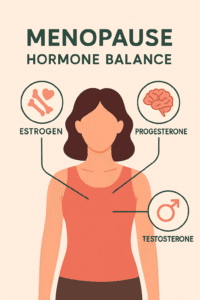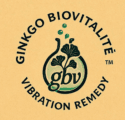
Menopause is not an illness — it’s a natural stage of life. Yet for many women, it can feel like a storm of changes hitting all at once. Hot flashes, mood swings, insomnia, and fatigue are more than just inconveniences. They are the body’s way of signaling that something fundamental is shifting: hormone production.
Understanding these hormonal changes and learning how to support the body through them can make this transition smoother, healthier and even empowering.
Hormones: The Silent Drivers of Menopause

Hormones are far more than chemical messengers — they are the conductors of your body’s entire orchestra. When they shift, everything from mood to metabolism can be affected.
- Estrogen: This hormone plays a key role in maintaining bone strength, regulating cholesterol, and supporting skin elasticity. Its gradual decline is linked to hot flashes, night sweats, mood fluctuations, and an increased risk of osteoporosis.
Progesterone: Often called the “calming hormone,” progesterone helps regulate sleep cycles and reduce anxiety. Lower levels can lead to irritability, difficulty falling asleep, and a restless mind at night. - Testosterone (yes, women have it too): Even though levels are much lower than in men, testosterone supports libido, muscle tone, and overall energy. As it decreases, some women notice fatigue and a drop in sexual desire.
Understanding these changes isn’t about pathologizing menopause — it’s about reclaiming control and making informed choices about health.
What Science Says
Recent studies have highlighted the connection between lifestyle, nutrition, and hormonal balance.
For example, a 2023 study published in Maturitas, the journal of midlife health, found that women who followed a Mediterranean-style diet — rich in vegetables, legumes, olive oil, and omega-3 fats — reported significantly fewer hot flashes and better sleep quality.
Such findings show that nutrition is not just about calories — it’s about biochemical support. The right foods provide the building blocks for hormone production and help regulate inflammation, which is key during menopause.
The Role of Naturopathy
Naturopathy focuses on supporting the body’s natural ability to restore balance. It offers a whole-person approach that combines diet, lifestyle changes, stress management, and targeted supplements when needed.
At GINKGOBIOVITALITE™, we often recommend a combination of nutrient-rich foods, gentle herbal remedies, and stress-reducing practices tailored to each woman’s needs. Our approach is to empower women to take an active role in their health, rather than just manage symptoms.
- Nutrition: We suggest including phytoestrogen-rich foods like soy, flaxseeds, and lentils to help gently modulate estrogen levels.
- Sleep support: Natural solutions such as valerian root or magnesium can help restore deeper, more restorative sleep without dependency.
- Stress management: Mindfulness exercises, yoga, and deep breathing can help regulate cortisol levels and improve overall hormonal balance.
Lifestyle Foundations
Menopause is also an opportunity to reset routines:
- Exercise regularly (weight-bearing exercises strengthen bones and preserve muscle mass).
- Stay hydrated and minimize caffeine and alcohol, which can worsen hot flashes.
- Prioritize sleep — create a calming evening routine, avoid screens before bed, and keep the room cool.
Conclusion
Menopause marks the beginning of a new chapter, not the end of vitality. By combining evidence-based nutrition, mindful lifestyle choices, and the personalized guidance naturopathy offers, women can transition through this phase with strength and confidence.
At GINKGOBIOVITALITE™, our mission is to provide women with science-based tools and practical tips so they can feel supported every step of the way.
![]() GINKGOBIOVITALITE ™ – VIBRATION REMEDY ™ Team
GINKGOBIOVITALITE ™ – VIBRATION REMEDY ™ Team
